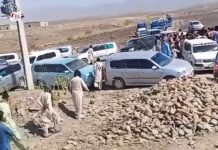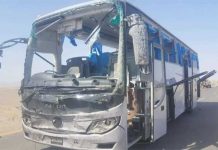Author: Haji Khan Baloch
When a nation is repressed and enslaved, its language, culture, history, education, and society are all corrupted, leading to the eventual reduction of the nation to nothingness. The most extreme form of genocide is the oppression of a nation and making them suffer.
The Holocaust was one of the most horrific genocides the world has ever witnessed. The Jewish genocide took place during the Second World War between 1941 and 1945. The German Nazis carried out the genocide against their rivals, primarily the Jews, with around six million Jews exterminated using various methods and strategies. With the nomination of Adolf Hitler as chancellor on January 30, 1933, the administration established a network of concentration camps for political adversaries, with Jews being the primary targets. On March 22, 1933, the first camp, Dachau, was constructed. With the passage of an Act on March 24 giving Hitler dictatorial authority, the government immediately began separating Jews from the civil society by boycotting their businesses, robbing them of their belongings, and setting their buildings on fire. The Nazis established ghettos and countless additional camps after their invasion of Poland to separate Jews. Shortly after the segregation of Jews into ghettos, the Nazis completed their extermination policies and declared it the conclusive answer to the Jewish problem, radicalizing all antisemitic measures. The Holocaust against the Jews happened in Germany and anywhere else the Nazis and their supporters controlled. The paramilitary death squads killed over 1.3 million Jews while working with Nazis and their collaborators through mass killings and pogroms. By mid-1942, Jews were transported from ghettos all throughout Europe to extermination camps via enclosed freight trains, where any who survived the voyage were put to death using a variety of methods. The Nazis executed Jews using various tactics, including starvation, physical and mental torture, medical experiments, mass killings, massacre, death marches, and gassing. They also forced Jews to live in dangerous conditions, work or be beaten to death. The Nazis used every strategy, tactic, and means to exterminate Jews until the end of World War II in May 1945. A few years later, in 1948, after the British mandate of Palestine, the Jews successfully established their own Jewish state, Israel, to guarantee their safety, freedom, and dignity.
Pakistan’s systematic genocide against the Baloch
Baloch genocide is an ongoing atrocity since Pakistan’s occupation of Balochistan. The worst day for the Baloch nation was March 27, 1948, less than a year after Balochistan was declared a free and independent state on August 11, 1947. On this day, Baloch nation lost their freedom and sovereignty to Pakistan. Balochs have experienced the worst types of human rights violations and atrocities while living under Pakistan’s control. According to Article 5 of the Universal Declaration of Human Rights (UDHR), which states that “no one shall be subjected to torture or to cruel, inhuman, degrading treatment or punishment,” Balochs have continuously been subjected to severe mental and physical torture, similar to what Jews experienced. Moreover, numerous terrible diseases have struck Balochs as a result of the nuclear test that occurred on May 28, 1998. Balochs have been and continue to be the victims of enforced disappearances, kill-and-dump practices, mass graves, bogus encounters carried out by Pakistani law enforcement agencies and their created death squads, malnutrition, and forced to live in hazardous conditions.
Let me recount some heinous crimes committed during the Baloch genocide. As a result of a guerrilla uprising by members of the Marri tribe against Pakistan in 1969, the Pakistan army, under the command of General Tikka Khan, widely known as the Butcher of Balochistan, bombed villages and slaughtered civilians. The Pakistan army carried out a military operation in 1973, bombing civilians, notably women, children, the elderly, and their livestock, causing many to starve as they had no access to food and water. Around 8,000 people perished in this military operation, predominantly women and children. In September 1974, the civilian population in Chamalang, Balochistan, was massacred, tortured and subjected to enforced disappearances; some of those people are still missing today, and many were forced to migrate to Afghanistan. The Pakistan army also reportedly threw some civilians from helicopters from great heights. Since the day of the occupation, the Pakistan army has been conducting ongoing military operations against the Balochs. The infamous Nawab Akhbar Khan Bugti’s home was bombed in Dera Bugti on March 17, 2005, killing about 70 people, the majority of whom were members of the Hindu community living there. To this day, Balochs continue to experience such brutal military operations in various areas of Balochistan, with their possessions being pillaged and destroyed.
On March 28, 1998, when Sardar Akhtar Mengal was the chief minister of Balochistan under Pakistan’s rule, a nuclear test was carried out in district Chagi Balochistan by Pakistani authorities. The residents and wildlife of Chagi have been and continue to be severely impacted by this nuclear test. In addition to the ongoing drought and the region’s transformation into a cancer hotspot for diseases, including throat and lung cancer, the nuclear test also caused almost 90% of the region’s wildlife to perish.
In Balochistan, people are forced to live in hazardous conditions with inadequate access to clean drinking water, vulnerable to a number of severe diseases, and lack access to medical facilities. Many cases have been seen in various regions of Balochistan, such as people being affected by measles and losing their lives in huge numbers in Sarawan, Makran, and Jahlawan regions of Balochistan, and in 2022, in Pirkoh Dera Bugti hundreds of people died from cholera due to having no access to safe drinking water and medical and health care.
The constant occurrence of forced disappearances has been the most horrific experience the Baloch have had to endure since the beginning of their occupation. The most terrible and conspicuous example of Pakistan’s systematically organized genocide against the Balochs is forced disappearances. Daily, people are abducted, physically and mentally tortured, and in most cases, beaten to death. In one recent instance, an elderly man named Dad Baksh was summoned to a Pakistani military camp in Awaran district of Balochistan, where he was severely beaten and tortured before being released. On the way home, he succumbed to his injuries and passed away.
The fact that the bodies of missing Balochs are discovered in mass graves, on roadside ditches, in rivers, and in remote areas is not surprising. Eight mass graves, in which 169 bodies were found according to the Asian Human Rights Commission (AHRC), were discovered in Balochistan’s Totak town of district Khuzdar in 2014. Similarly, many more mass graves have been discovered in other areas of Balochistan, such as Panjgoor and Turbat districts.
The fact that the bodies of missing Balochs have been discovered in mass graves, roadside ditches, rivers, and remote areas is not surprising. According to the Asian Human Rights Commission (AHRC), 8 mass graves were discovered in Balochistan’s Totak town of district Khuzdar in 2014, containing 169 bodies. Similarly, many more mass graves have been discovered in other areas of Balochistan, such as Panjgoor and Turbat districts. In the same location, Totak town of Khuzdar, in 2011, the Pakistani army carried out a bloody military operation that left many natives dead and missing, some of whom are still missing. The control of the area was then handed over to Shafeeq Mengal, one of the heads of the death squads. The mass graves in Totak were discovered close to the a Shafeeq Mengal built concentration camp.
Reports claim that Pakistan’s intelligence services and their organized death squads have enforcedly disappeared over 20,000 people from different regions of Balochistan. So far, about 7,000 tormented, malformed, unrecognizable dead bodies have been discovered in Balochistan, including women, children, and elderly people. Recent examples include Rasheeda Zehri, who was abducted together with her husband, children, and mother-in-law. Following severe physical and mental torture, Rasheeda, her children, and mother-in-law were all freed in reaction to numerous protests. However, her husband Rahim Zehri is still missing. Another incident that sparked intense animosity and resentment among Balochs toward Pakistan involved the counterterrorism department (CTD) raiding the home of the widowed Mahal Baloch, torturing and abducting her along with her two daughters, who were hardly 7 years old at the time. Her daughters were later released, but Mahal Baloch was charged with filing a false police report (FIR) designating her as a suicide bomber. In Balochistan, the counterterrorism department (CTD) also targets missing persons through fictitious encounters. After killing them, the victims are labeled as insurgents and associated with active insurgent groups.
People in Balochistan are traumatized and forced to live in fear of being abducted, tortured, victims of false CTD encounters, or going missing for years. The entire Balochistan has been transformed into a concentration camp.
By establishing their own free, sovereign, independent state of Balochistan, like Jews and other sovereign nations, Balochs can have the assurance of their lives, safety, protection, dignity, and freedom.
In conclusion, the Holocaust and the Baloch genocide are two of the most horrific genocides in history, with both resulting in the mass extermination of innocent people. While the Holocaust is widely recognized and taught in schools around the world, the Baloch genocide has largely gone unnoticed and unacknowledged by the international community. It is important to remember and learn from both of these tragedies, and to work towards preventing such atrocities from happening again in the future. Every nation and individual should be given the right to live freely and with dignity, and no one should have to suffer such atrocities.





























